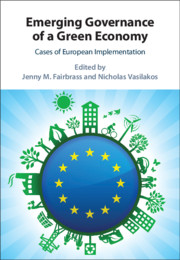13 results
Contents
-
- Book:
- Emerging Governance of a Green Economy
- Published online:
- 20 January 2021
- Print publication:
- 21 January 2021, pp v-vi
-
- Chapter
- Export citation
Book Synopsis
-
- Book:
- Emerging Governance of a Green Economy
- Published online:
- 20 January 2021
- Print publication:
- 21 January 2021, pp xiii-xiii
-
- Chapter
- Export citation
Index
-
- Book:
- Emerging Governance of a Green Economy
- Published online:
- 20 January 2021
- Print publication:
- 21 January 2021, pp 157-158
-
- Chapter
- Export citation
Copyright page
-
- Book:
- Emerging Governance of a Green Economy
- Published online:
- 20 January 2021
- Print publication:
- 21 January 2021, pp iv-iv
-
- Chapter
- Export citation
Acknowledgements
-
- Book:
- Emerging Governance of a Green Economy
- Published online:
- 20 January 2021
- Print publication:
- 21 January 2021, pp xiv-xiv
-
- Chapter
- Export citation
Abbreviations
-
- Book:
- Emerging Governance of a Green Economy
- Published online:
- 20 January 2021
- Print publication:
- 21 January 2021, pp xv-xviii
-
- Chapter
- Export citation
9 - The Green Economy
-
-
- Book:
- Emerging Governance of a Green Economy
- Published online:
- 20 January 2021
- Print publication:
- 21 January 2021, pp 148-156
-
- Chapter
- Export citation
Contributors
-
- Book:
- Emerging Governance of a Green Economy
- Published online:
- 20 January 2021
- Print publication:
- 21 January 2021, pp viii-x
-
- Chapter
- Export citation
1 - The Green Economy
-
-
- Book:
- Emerging Governance of a Green Economy
- Published online:
- 20 January 2021
- Print publication:
- 21 January 2021, pp 1-13
-
- Chapter
- Export citation
Preface
-
- Book:
- Emerging Governance of a Green Economy
- Published online:
- 20 January 2021
- Print publication:
- 21 January 2021, pp xi-xii
-
- Chapter
- Export citation
Figures and Tables
-
- Book:
- Emerging Governance of a Green Economy
- Published online:
- 20 January 2021
- Print publication:
- 21 January 2021, pp vii-vii
-
- Chapter
- Export citation
3 - The Green Economy as Good Governance
-
-
- Book:
- Emerging Governance of a Green Economy
- Published online:
- 20 January 2021
- Print publication:
- 21 January 2021, pp 34-53
-
- Chapter
- Export citation

Emerging Governance of a Green Economy
- Cases of European Implementation
-
- Published online:
- 20 January 2021
- Print publication:
- 21 January 2021

